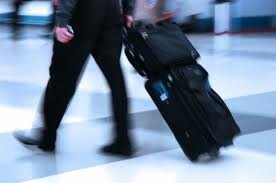High Tech Can Dissolve Healthy Boundaries For Business Travelers

More and more jobs are requiring people to engage in travel as a continual part of their work. High tech solutions to communication have made it easier to travel and get the job done, and, to our stress-level’s demise, travel and never get away from working on that job. As I flew from Newark to Denver on the way back from speaking and training in The Azores Islands, the man next to me spent the entire transcontinental four-hour flight glued to his laptop working on a PowerPoint presentation. The absolute second (no exaggeration here) our wheels hit the Denver tarmac he turned on the iPhone he had poised for action and began responding to e-mails. Oh, and by the way, this was all happening Friday night!
Now, is high tech to blame? When we can do the work remotely, should we always? Where are the healthy boundaries essential to our health and wellness.? My laptop was in it’s case and turned off the whole trip back. I turned on my phone at some point, I think in baggage claim. It was Friday night, for crying out loud! Then again, I don’t work for this fellow’s company, or own his business. I have no ideas about the life of that particular fellow traveler and what I felt was pity and compassion for him more than criticism. However, the question is, how many of us are living his kind of life?

In the wellness coaching I’ve done for many years I’ve encountered lots of people like our anxious friend here. They usually try their best to meet what they perceive as the expectations of their job and, much too often, develop all sorts of stress-related disorders, gain extra weight (the stress/cortisol connection to weight gain is well documented http://www.unm.edu/~lkravitz/Article%20folder/stresscortisol.html), drive up blood pressure, pump stomach acid, etc., etc. They also, tragically find that this way of “living to work” instead of “working to live” has detrimental affects of relationships with family, partners, etc.
There are both external and internal sources of the stress and urgency that work-driven people feel. Yes, we need to validate the experience of people who have jobs that continually set production expectations at unrealistic levels. Companies that create health problems this way have no room to gripe about paying the bill for the poor health of their employees. Sometimes there are ways to affect the workplace and adjust the work pace, and sometimes this is not an option. In some situations we can find ways to cope better, in other situations where nothing will respond to our efforts to make it better the conclusion becomes one of self-preservation and leaving that job may be the healthiest move one ever made.
Then there is the internal perception of work in our lives. There’s reality, and then there’s fear. That fear may be realistic, or what we feel may be much greater than the situation warrants. The sources of our exaggeration can be many. Our perception can be distorted by feelings of inadequacy and low self-worth driven by any number of old family dynamics and other earlier experiences in our lives. Folks buy into what psychotherapist Albert Ellis called “irrational beliefs”, a classic of which is that “One absolutely must be competent, adequate and achieving in all important respects or else one is an inadequate, worthless person.” (http://changingminds.org/explanations/belief/irrational_beliefs.htm).

Work/Life Balance has been a focus of life coaching since it’s inception, and is a central issue if much of the wellness and health coaching that is done today. Gaining insight about one’s tendencies to drive one’s self and overwork can be a critical first step to mastering this challenging balancing act. Coaching may be the answer, but often deep-seated beliefs that drive “work-aholism” (http://www.heartsandminds.org/self/links/workaholism.htm) and perfectionism require rolling up one’s sleeves and doing some counseling. Self-help books might get one started, but to truly achieve change in this tough area, having an ally may make all the difference in the world. Healthy boundaries are what make work and life come into balance. Wouldn’t it be nice to sleep on that flight back home? (If you can in one of those airline seats!)








Only registered and logged in readers can leave comments.